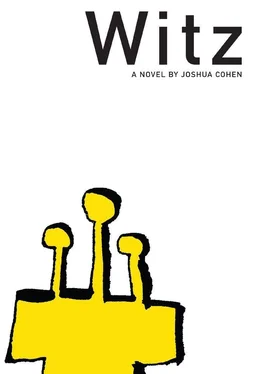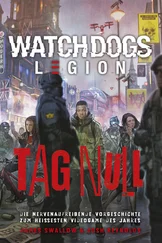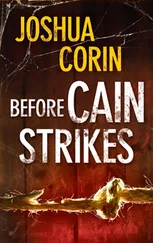And still sitting, slumped, wasted, waistexhaled all unbuttoned notch expansion, slippers off without socks and in an even more comfortable chair at the head of the table, his, looking down the seats and settings at his kinder, his friends and guests, his new employee, the mensch’s girlfriend or wife unknown be thy name, and laughing at whatever his wife’s laughing lipstick at if only because she’s laughing at it and healthily, strong — the lipstick that says I’m still red and angry, but this is how I want to look to love you with company curious — Israel looks down at his plate and considers the chicken and he knows, don’t ask him how he just knows, that this chicken has cancer, that his chicken died of cancer and died for him from cancer, expressly, painlessly quick. He cuts his cancer with his cancerous cutlery (presents and the plates, too, and all of it from relatives who’d died how, give you one guess), then chews his cancer with his cancerous teeth, swallows his cancer, washes it all down with a glass of cancer from his cancerous glass, wipes his cancerous mouth with cancer metastasized as a napkin, its darkening starch, and then swallows again cancerously feeling the swallowed cancer, the throat cancer, mingle carcinogenically with the stomach cancer its gastric adenocarcinomatic manifesting intestinally and beyond, making for an even stronger, an even more weakening, more carcinogenic cancer cancering all and then turns more to the left, leaning, reclining as if appearing to rest but really in pain says to his Hanna: Hanna, it’s all so delicious and thank you, then across the table to his right and further down toward the kinder to the Feigenbaums there, Mister Feigenbaum now nursing with napkin and ice his head, the wound incurred through the oven, would he sue — him shifting uncomfortably in his seat with the urge to loose himself, sick — Misses Feigenbaum, whatever her name is, maybe Faye, he forgets, make sure she gives you the recipe: chicken, slaughtered and shipped, still feathered a little, frozen in the freezer, defrosted in the fridge, giblets removed for their own preparation (don’t forget to preheat), delicious offal reciped to a malignant perfection; motherchosen last day the seasons stained out of the book, made with prunes, raisins, all sorts of fruity sweetnesses — and cancerous, has to be, these secretions expressed from the bake of its carcass, whose last breast has been excised for the removal of its diseased bones from his plate to his wife’s, and how he sops the seep up with a hunk of the challah he’d bought, those two loaves as if the salted halves of the heart, the kidneys, the lungs, the gizzardy liver, how they all must be bad for you, too.
The drawer was opened and never shut and hung like her mouth.
A door hangs open on its hinges, Hanna shuts it, wipes clear its glass with a cuff.
The screenedin porch’s door’s open as well.
Everything open she needs to shut, she won’t stand for open, which makes her feel slightly ill, mistaken. It’s the pregnancy, her fat with a scapegoat. Let us grow bloated and blame.
With everything shut, everything’s perfect, as if nothing ever went soiled, gone spoiled, as it was and has been clean forever, without taint; she’s talking to herself pure from the very beginning — all that’s dull the life and the knifing made sharp upon the whetstone of her tongue, foods wrapped to keep in her skin, how she’d always served, never served herself, never been served herself, that’s if you forget Wanda and how in her high mighty she daily does. Which is terrible, makes her feel what, slighting, mistaken, and ill. But now she opens a drawer, and leaves it open to feel it, the sin.
In the drawer are the towels, and there folded responsibly, neatly, under the towels, the rags, the ripped pieces of old white dress shirts gone inked, skiddled underwear spangled with monsters. Patched together and held torn with sop. Rags once engaged as veils to hide the about to be wed, the knotted napkin she’d held with her husband for dancing at their reception, then once slit a hole with scissors it’s for knowing each other later that night, while hiding the nakedness, pleasure. And under all the rags folded below the towels at the very rooting bottom of the stack and there almost stuck to the plastic lining of the drawer is the Rag — the dirtiest rag, the unmentionable, the secret, the rag best forgotten, for mistakes made and of them.
This had been a napkin, from her wedding, their wedding, from the banquet or maybe it was a cateringhall she didn’t want it at but — a long story — from the table, from the very placesetting of the mensch she’d thought of as her father, zichron l’vracha as they say, when he was still alive and married himself to her mother: once white (the tablecloths had been offblue, as if ordered prestained, used or rented), this unwashed, neverwashed Rag’s unmentionable as much say as her underwear’s sexy or not, it’s a secret; at most she shakes it out outside, or now in winter off either the screenedin or windowed porches; how she can’t ever wash it, mustn’t, she needs it like this, needs the history, the past and its record of stains and grains — if it were to be found, she thinks it would turn her , sully reputationwise, ruin the marriage, though who would find it, Wanda, and then know what to do with it once found and, nu, why would that or they matter, why should they? The Rag’s soakedup the seas, the sevenfold oceans, encrusted with everything spilled and stained until the stains they aren’t stains, grains or seeds or the cancel of blackmail — they’re the Rag itself, its weep into form. It’s shvitzsoaked, stinks of spoiled milk and meat together — it’s scandalous, isn’t it? when they’d first moved in — after lawschool, even after loans paidoff, through ten years of their runging up the ladder — it’d hung on the oven, that was years ago, two stoves in the past; now it’s stained with everything since, thinking, it’s tough even to think about: it’s bloodcaked in seven species’, it’d wiped up muddy footprints from the tile floor, it’d sopped up overflows and drippings when a lid was unfastened; how she’d strain and shray for Israel who’d loosen and how some liquid would always spurt out, or, slicing a vegetable, like a head with so much between the ears, some seeds would leak all over the formica, to be wiped up always with this.
Now, the Rag’s as hard as a plate and its corners, its edges like blades, as sharp as a shard — as if a piece of the glass it’d wrapped that Israel had broken underfoot at their wedding (whose wine had been cleanedup with whatever’s around).
Hanna replaces the other towels atop, takes the top placed to do the dishes, with which to dry them, Israel’s undershirt shmatte — with it draping each object as if magic or fragile, to decide: which is a bowl and which is a plate, deep and with a stiffly high lip she’s not sure; only to scrape whatever’s been missed by the dishwasher, the machine and not Wanda, her neither — sauce stuck, a crumb caught. Holding a serving of silver, a platter, up to the light; the last to be replaced before darkness, the darkness of its appropriate drawer: she looks at her face looking at her, as if asking whose fault, misdirection; the platter’s edge a rose garland, she likes how it frames her face, which in turn frames the eyes: for a lighter brow, she tilts from; for fuller lips, she tilts toward. That stain, the remains of the afternoon, the morning’s meal ingrained: reflected at forehead, this mole made from a freckle, a kinder’s pox or the swelling of hives, must scrub it away — steelwool as if it’s been shorn from her thighs, grown between them…
Hanna replaces the knife from the floor to the sink to the towel to dry at the edge of the sink and now to its own drawer again, which she shuts; she takes a new towel from the other, adjoining, runs an edge around each tine of a servingfork, finished with the drying; until, she’ll begin a new meal, which begs a new wash.
Читать дальше












